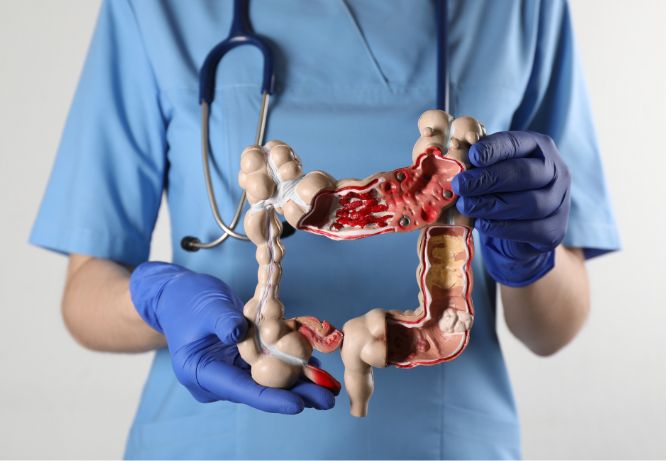Colon cancer is a prevalent health issue, but many people are unsure about its hereditary aspects. Understanding whether colon cancer can run in families is crucial for early detection and prevention. In this detailed exploration, we’ll discuss the hereditary nature of colon cancer, the role of genetic testing, preventive measures, and where to seek expert care.
Hereditary Colon Cancer: An Overview
Colon Cancer and Genetics
Colon cancer arises when abnormal cells in the colon or rectum grow uncontrollably. While most colon cancer cases occur sporadically, about 5-10% are hereditary, meaning they result from genetic mutations passed down from parents to children.
Hereditary Syndromes
- Familial Adenomatous Polyposis (FAP):
- Overview: FAP is a rare genetic disorder characterized by the development of numerous polyps in the colon and rectum. These polyps typically begin forming in adolescence and can turn cancerous if not removed.
- Management: Individuals with FAP usually require regular surveillance and may need surgical intervention to prevent cancer.
- Lynch Syndrome (Hereditary Nonpolyposis Colorectal Cancer or HNPCC):
- Overview: Lynch Syndrome increases the risk of colon cancer and other cancers, such as endometrial and ovarian cancer. It often leads to cancer at a younger age compared to sporadic cases.
- Management: Regular screenings, such as colonoscopies, and preventive measures are recommended for those with Lynch Syndrome.
Genetic Testing: Understanding Your Risk
Genetic testing can provide insights into whether you carry mutations associated with hereditary colon cancer. Here’s what you need to know:
- Genetic Counseling: A genetic counselor helps you understand your family history and the implications of genetic testing. They provide guidance on whether testing is appropriate for you.
- Testing Process: Typically involves a blood sample that is analyzed for specific genetic mutations. Positive results can help in planning preventive strategies and monitoring.
Preventive Strategies and Surveillance
For individuals at higher risk due to hereditary factors, early intervention is key. Preventive strategies include:
- Regular Colonoscopies: Starting at a younger age, often recommended every 1-2 years, to detect and remove precancerous polyps before they develop into cancer.
- Medications: Certain drugs may help reduce cancer risk in high-risk individuals.
- Lifestyle Adjustments: Maintaining a healthy diet, regular exercise, and avoiding tobacco use can contribute to overall health and potentially reduce cancer risk.
Recognizing Symptoms
Even with preventive measures, it’s important to be aware of potential symptoms of colon cancer:
- Abdominal Pain or Cramping: Persistent discomfort or cramping in the abdomen.
- Changes in Bowel Habits: Persistent diarrhea, constipation, or changes in stool consistency.
- Blood in Stool: Visible blood or black, tarry stools.
- Unexplained Weight Loss: Losing weight without a known reason.
- Fatigue: Feeling unusually tired or weak.
If you experience any of these symptoms, seek medical advice promptly.
Expert Care: Where to Turn
For those seeking expert guidance and advanced treatment options for hereditary colon cancer, Dr. Vikesh Shah is a leading figure in India. Renowned for his work in cancer care and immunotherapy, Dr. Vikesh Shah’s clinic in Ahmedabad offers comprehensive services for colon cancer patients.
Dr. Vikesh Shah is recognized across India for his expertise and has become a go-to cancer immunotherapy specialist in India. His clinic provides state-of-the-art treatment and personalized care tailored to individual needs.
Conclusion
Understanding the hereditary nature of colon cancer is essential for managing your risk and making informed health decisions. Genetic testing and preventive measures can significantly impact outcomes. For those seeking expert care, Dr. Vikesh Shah’s clinic in Ahmedabad offers a valuable resource for advanced cancer treatment and personalized support. His reputation as a leading cancer doctor in India makes his clinic a top choice for comprehensive cancer care.
Stay proactive about your health and consult with specialists to ensure the best possible outcomes for you and your family.

